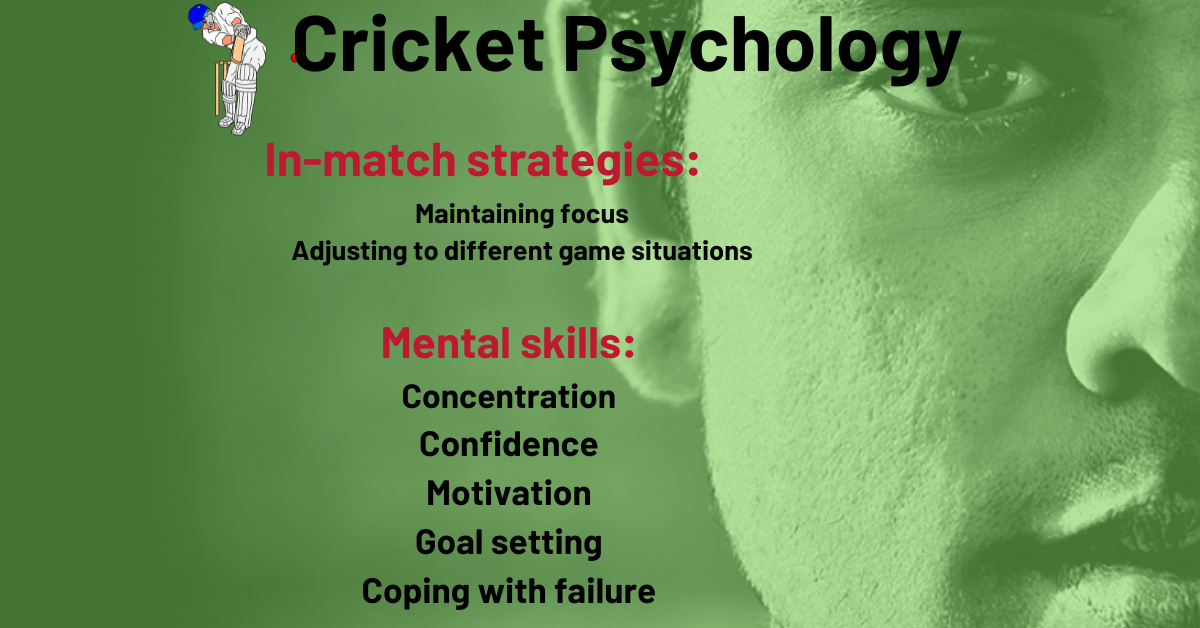While the physical demands of cricket are well known, the psychological aspects of the sport referred to as cricket psychology, are often overlooked. However, the mental skills required for cricket can be just as crucial as physical abilities. From managing stress and anxiety to coping with the pressure of competition, the psychological challenges of cricket can have a significant impact on players and their performances.
The physical sport of cricket is interconnected with cricket psychology and we are here to explore this relationship.
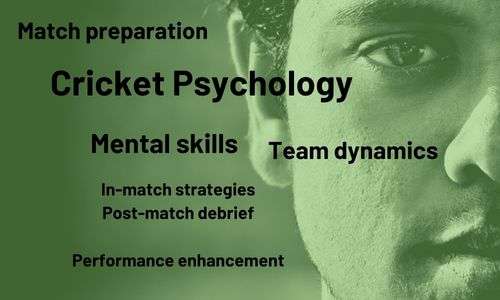
CRICKET AND THE SCIENCE OF MIND
“H. E. M Ansari, a writer who explained cricket and the science of mind in his book and designed the concept of cricket psychology to elaborate the entertaining pattern of cricket. He triggers the cricket, the world, and the love for this game. Cricket is somehow a very lucrative sport and doesn’t fail their lovers to demoralize for this. How to fix cricket in your everyday life is basically a science.
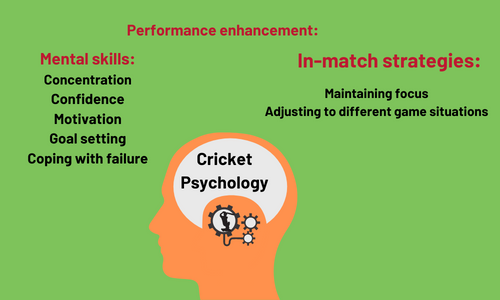
Science is a revolutionary factor, this reality, our surroundings, our observations, and everything beyond philosophy indulges science. Cricket psychology has science for the players as well as the spectators. Both use their five senses, and intuition while guessing the upcoming moment, a massive amount of emotions and feelings, including those related to cricket psychology, plays a role in this sport.”
Cricket Psychology on the Pitch
In the adherence of psychological battle of the pitch, we will discuss two basic perspectives.
- How does the baller use to read the mind of a batsman?
- What are the ways in which the batsman can anticipate the bowler’s next move?
Reading the Batsman’s Mind
The baller can judge the batsman over two categories; on the basis of visual feedback and on the basis of invisible feedback.
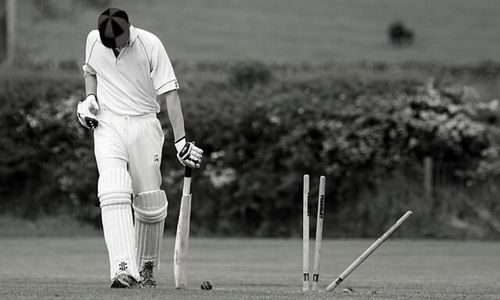
1. Visual feedback:
“Visual Feedback, a concept within cricket psychology, integrates the observable knowledge, the one which is visible and can easily get stored in sensory memory. In visual feedback, the first step to studying the batsman’s mind is through their BATTING TECHNIQUE that covers the concept of Stance, Footwork, Batting pattern, and Scoring area. Every bowler, whether spinner or fast bowler, should know the history, mindset, and strike rate of a specific batsman while competing against them, using the principles of cricket psychology to gain a competitive advantage.”
2. Invisible feedback:
Invisible feedback includes the information in a disguised manner through hand and eye coordination and through mental. The bawler first investigates the repetition and confidence of certain opposite players.
VISIT OUR HOME PAGE FOR MORE READING
Anticipating the Bowler’s Next Move
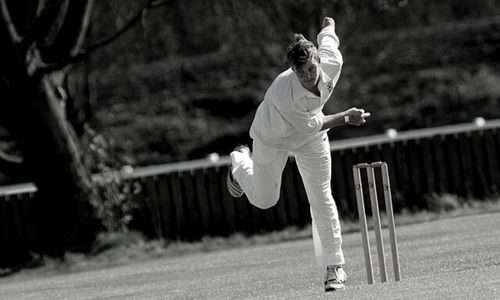
Anticipating the bowler’s next move is a key aspect of cricket psychology and a crucial skill for a batsman in cricket. It requires a combination of physical technique and mental acuity, as the batsman must read the bowler’s body language and delivery to predict the type of ball that will be delivered, using principles of cricket psychology to inform their decision-making. We are exploring below the various ways in which a batsman can anticipate the bowler’s next move and how it can help them succeed at the crease, using cricket psychology to improve their performance.”
1. Observe the bowler’s body language and delivery
A bowler’s body language and delivery can provide clues about the type of ball they are about to deliver. Pay attention to the position of their feet, the angle of their arm, and the way they release the ball to get an idea of what to expect.
2. Line and length:
Batsman first keeps their eyes and head on the releasing point of the bawler and predicts the line, length, and type of the ball. Through their bawling style, the batsman consolidates their performance and fights with that upcoming ball in their way. Judging the length and line earlier is more effective otherwise their failure will lead to a disadvantage.
3. Prognosticating the pitch:
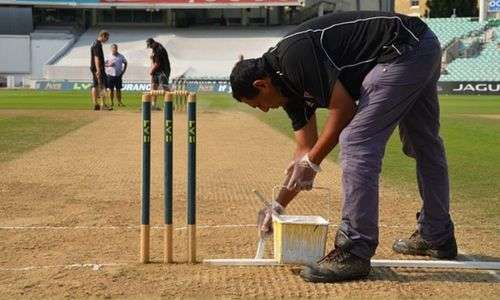
Analyze the pitch conditions: The condition of the pitch can also influence the bowler’s strategy and the type of ball they deliver. Look for any unevenness or cracks in the pitch that might cause the ball to behave differently.
Forecasting the pitch is mostly a common standpoint for both bowlers and batsmen for contentment and determination. If the pitch is supporting the bawlers then it would create drastically hopeless effects for the batsman and so they resist the motivation, and if the pitch would be a favorable factor for the batsman then the bawlers will most probably suffer the adversary comebacks. Hence it requires more effort for the bawlers and batsman to practice their skills for both situations and to survive by giving their best.
ROLE OF PSYCHOLOGY IN CRICKET:-
In cricket psychology plays a role in a very massive term, every player has his own intensity of behavior as psychology studies the behavior and all the mental processes occurring within the individual. There are many athletes with differences in strength, anxiety and stress variations, coping mechanisms, multiple behavioral problems, etc. Some are suffering from diagnostic disorders and some are suffering through weary situations that have a major impact on cricketers’ lives.
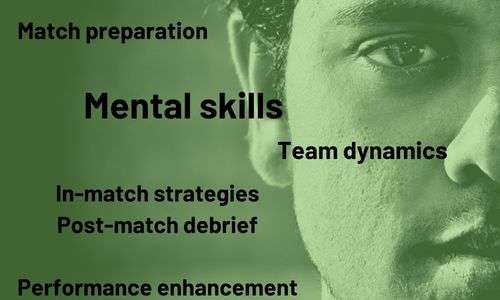
Psychology, on the other hand, plays a role in the reference of bio-neuroscience within the players. For instance, eye movements are controlled by the hemispheres, as the right eye is controlled by the left hemisphere and the right hemisphere is then responsible for the left eye. If one of the athletes has impairment in creativity then is manifested by the damaged Left hemisphere. Similarly, every cricketer has an unlike intelligence score, some are more sagacious to perform and some are a bit poor to attain the acquirement. If we perceive in the region of Bio Neuro Science then intelligence is repercussed by the appropriate functioning of the right hemisphere.
Psychological factors Impacting on Performance in Cricket
Applying true psychology is very effective for every player to perform well, identifying their strengths and weaknesses and having self-realization of their mental problems and behavioral dysfunctions will help them a lot.
Psychological factors can have a significant impact on the performance of cricket players. These factors can include confidence, motivation, focus, and mental toughness.
Stress and anxiety
Stress and anxiety are the second reason for indulging them in hardships and failure. They may become neurotic and hostile which will target their reputation and competing skills. Players should know the resolving procedures of their anxiety to resist any cynical happenings and controversial events.
Focus and concentration
Maintaining focus and concentration is just as important as having the right equipment for playing cricket. Without these, a player’s confidence and chances of winning will be greatly affected. In cricket, it is crucial for players to pay close attention to every aspect of the game, from hitting the ball to predicting and reacting to different situations. Those who are able to stay focused and concentrate under pressure will be more likely to make sound decisions and perform at their best.
Mental toughness

Another demand requires for a batsman or bawler is to develop mental toughness. Mental toughness is one’s rigidity to get to your way of success and requests for the avoidance and enduring of every hurdle and hardship. Mental toughness refers to a player’s ability to handle adversity and bounce back from setbacks. Cricket can be a mentally demanding sport, and players who are able to maintain their composure and focus under pressure will be more likely to succeed.
Motivation
Motivation is also crucial for cricket players. Without the desire to succeed and improve, a player may not put in the necessary work and effort to reach their full potential. Factors such as team goals, personal goals, and the desire to compete can all serve as motivators for cricket players.
HOW CRICKET PLAYERS CAN DEVELOP MENTAL TOUGHNESS
Mental toughness is a crucial trait for cricketers to possess, as it allows them to maintain focus and concentration during a game, even in front of a large audience. Are you interested in learning how to develop this important skill? Keep reading to discover some helpful tips and strategies.
Developing Emotional Control
For cricketers, mental toughness is an important factor to have a calm game in front of audiences. One aspect of mental toughness is the ability to maintain control of your emotions, particularly when the game does not go according to plan. When the opposition team celebrates a success, it can be tempting for a batsman to overreact or lose their temper. However, this can lead to shame and embarrassment for the whole team. Instead, it is important for cricketers to regulate their emotions and not give up, even when faced with difficult circumstances.
ALSO, READ
Building Confidence and Overcoming Social Inhibition
Confidence is another key to developing mental toughness in cricket. Confidence in abilities helps to motivate players and drive them towards their goals. Interpersonal confidence, on the other hand, allows players to overcome feelings of inadequacy and engage with their surroundings, even when faced with significant interpersonal contact or the risk of criticism. Cricketers should strive to build both types of confidence in order to perform at their best.
Embracing Challenges
Welcoming new challenges and opportunities can help cricketers maintain their mental toughness. A risk-oriented mindset and a willingness to embrace new things can help players stay motivated and focused on their goals. Additionally, learning orientation, which involves seeking out new knowledge and experiences, can also help cricketers improve their skills and mental toughness. Finally, commitment to their profession is crucial for cricketers, as it involves both achievement orientation and goal orientation. Cricketers should be stubborn in their pursuit of success, while also being committed to the game and the process of facing challenges and learning from them.
STRATEGIES FOR SUCCESS :
To achieve success as a cricketer and earn a good reputation in this profession, there are certain strategies that must be followed. Talent, hard work, and discipline were first the very effective and demanding priorities to play as a district and international player but now this sport has manipulated and enlarged its importance in the sports world. Talent, hard work, and discipline don’t give positive and strong feedback at early ages. There are some other strategies that are placed top listed and worth focused to get to your goal.
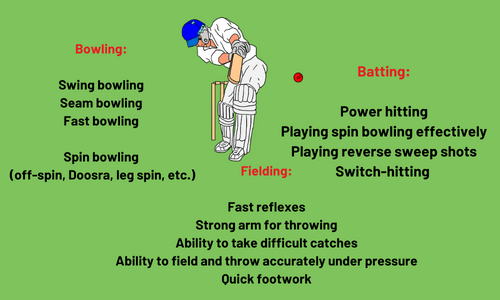
Focusing on Modern Skill Development
In today’s competitive environment, it is crucial to continuously develop and improve upon your skills in order to succeed. Talent and hard work are important, but they are often not enough on their own. By prioritizing skill development and staying up-to-date with current industry standards, you can stand out from the competition and achieve your goals.”
Game sense and self-belief
Game sense, decision-making ability, and self-belief work in direct proportion. The game sense affects decision-making and self-belief, and distortions in decision-making ability adversaries affect the power of game sense and confidence.
Game sense is cognition of how to play a game with better planning. Game sense involves a gut feeling of bawling style or batting format. A cricketer should know which ball will help a batsman to go back to their seat and a batsman should have a sense that which style of bawling will make them fail to hit it. Here the sense of the game is magnifying for both categories, bawler, and batsman. Intelligence, knowledge, and intellectuality are essential for every player within a team.
YOU MAY LIKE TO READ THIS,
How do the richest cricketers in the world earn their money?
Decision-making is a second thoughtful process, the ability to pick up the right decision can make a team more responsible. This skill can command others with an important playing agent and is a branch of honor and respect for that one player.
Everyone knows, without self-belief and confidence, nothing can come our way. It’s the first key to success. Without confidence, we can’t even socialize or participate in new challenges. Low confidence will lead to an inferiority complex which then gives rise to many other psychological problems and make you avoidant a personality.
Only a person with game sense can take decisions and only a self-assured person can trust his game sense and skills. We have an example of MS Dhoni who always changes his plan of delivering after every two overs to trick the opponent team and to create chaos for them.
Fitness and Leadership skill in Cricket
In the context of success in cricket, fitness is essential as it helps maintain the physical and mental well-being of players. A healthy diet and sufficient intake of nutrients can improve muscle development and overall performance on the field. Additionally, addressing physiological needs can also reduce stress and anxiety, which are common issues faced by cricketers.
Effective leadership is also crucial in building a successful team. A good captain should provide support, guidance, and respect to their teammates, and encourage a positive and optimistic approach to challenges. Dedication to the game is also key to success, as focusing on the task at hand and avoiding distractions can help players achieve their goals.
Psychological benefits of playing cricket
Playing cricket not only benefits the body physically. But also has so many psychological benefits that can be taken into account. These psychological benefits can be so positive and life-changing that they can modify a person’s mind. And a person can lead a life with a more refreshing mind. Because it not only brings subjective but also objective change in one’s experiences. The following are the psychological benefits of playing cricket:
Improves mental state
Playing any game that diverts the mind and makes the person feel fresh and physically active can lead to an improved mental state of a person. This improved mental state will further lead to an improved lifestyle. Any game greatly affects a person’s mental state, which is the most important aspect of their life. A person playing cricket has to be spontaneous in making real quick decisions which requires focus. As far as one maintains this focus may become more concentrated and devoted to the play. Focus is the main element in every sport because it’s the basic unit that needs to be maintained while playing such a game. This skill can polish a person’s mind and boosts the brain for more challenging phases of the game.
Improves social and fighting skills
Playing cricket can improve a person’s social life in many ways. It can not only take charge of a person’s social well-being but also helps one to face the hard phases of life. A player when socializes with people around them including other players, opponents, or fans can make him live a more socially reliable life. One knows how to treat people and handle more socially congested situations. One becomes more acceptable in society and leads a more satisfying life. Loss and winning in the game make the person face the good and worse situations of life by making them learn how to deal with and tackle such circumstances. The person has the capability to gain control over their nerves and think calmly about what to decide further.
Improves leadership and team skills
Playing any game can improve a person’s team skills and leadership capabilities. One gets to know how to manage a panic situation or how to treat their team members when they can’t go further with their strength. A great skill that is induced in a player is the ability to walk with all the power on different platforms together with other players
Improves personality and thought patterns
When a game is played it changes a person’s mind in a way that one becomes more broad-minded in coping with different situations in life. The personality of the person becomes flexible and groomed which makes one more indulging in positive things. All these benefits the mind that automatically leads to improved thought patterns of a person. One practice is to live life with clear and positive thinking. The mind gets out of negative thoughts and one becomes optimistic in living their life.
Cricket Injuries
Cricket is a physically demanding sport that requires players to be in top physical condition in order to perform at their best. However, despite the best efforts of players and coaches to prevent them, injuries are a common occurrence in cricket.
The psychological impact of cricket injuries on mental health
Cricket injuries can have a negative impact on a player’s mental health, leading to depression and long-term complaints. They can also cause stress and anxiety, leading to poor performance and low confidence. Injuries to the head can also lead to memory loss and emotional instability, and may even increase the risk of Borderline Personality Disorder.
Techniques for psychological recovery from cricket injuries
While cricket injuries can lead to mental health problems such as depression and suicidal thoughts, it is possible to make a comeback with the right support and techniques.
Therapeutic techniques: Seeking professional help, such as therapy and counseling, can help individuals recover from the psychological effects of cricket injuries. These techniques can help individuals realize their self-worth and improve their cognitive distortions. Daily exercises and yoga can also be helpful in reducing stress and easing physical pain.
